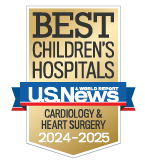Heart Failure Program
Nationally ranked by U.S. News & World Report

The Acute Care Cardiology Unit (ACCU) is devoted to the care of patients with cardiac disease, congenital or acquired. Patients on the unit are either directly admitted from the outpatient setting/emergency room; transferred from the CICU as they continue to recover from a recent cardiac surgery or procedure; or are transferred from the NICU for additional monitoring or education prior to discharging home. The goal of the unit is to provide specialized cardiac care that promotes healing and recovery to get our patients discharged home safely.
Conditions and therapies managed by the ACCT team
-
Congenital heart disease (heart disease a child is born with)
Your heart care team
At Children’s Mercy, your heart team includes experts from many different areas who all work together to build a care plan for your child’s unique needs. The same care team will stay with your family throughout your journey, and they meet regularly to be sure everyone is up to date on your child’s plan. Meet the Heart Center team.
Treatment options for heart failure
Medications can help manage heart failure for many children. When medications alone are not effective, Children’s Mercy also offers ventricular assist devices (VADs), which provide critical support to kids as they wait for a new heart.
Ventricular Assist Devices (VAD)
VADs are used in patients with severe heart failure to improve blood flow from the heart to the rest of the body. When standard medical management has not be able to correct the heart’s pumping problem, these devices are used as a bridge to heart transplant.
The most common device used at Children's Mercy is the Berlin Heart EXCOR pediatric VAD. This can be used to support the left, right, or both sides of the heart depending on your child's needs.
Cannulas (flexible tubes) are sewn into the heart and connected to a pump, or pumps, outside the body. A machine connected to the pump takes over the workload of the heart and allows for adequate blood flow to the body.
When the VAD improves the function of the heart, other organs begin to work properly as well. Although your child must remain in the hospital while on this device, it allows for them to resume some regular activities and have improved quality of life while waiting for transplant.
Kids at Children’s Mercy on a VAD have access to all kinds of resources. From playgroups and teen hangouts organized by Child Life specialists to first steps and tricycle rides with physical therapists, our support specialists help your child stay on track with developmental and academic milestones, as well as help them have fun and stay positive while they are in the hospital.
Heart Transplant Program
When no other medical or surgical options are available to fix a failing heart, your child may need a heart transplant. Waiting for a transplant can be a long and frustrating process. Our team will do everything possible to help your family stay comfortable, up-to-date and involved throughout the process.
A clinical psychologist will meet regularly with your family starting at the time of your diagnosis. A full team of support specialists—Child Life specialists, hospital-based school teachers, occupational and physical therapists, and other support staff—will give your child a sense of normalcy while you wait for a heart.
- Heart Center
- Adult Congenital Heart Program
- Cardiac Intensive Care Unit (CICU)
- CHAMP
- Fetal Cardiology Program
- Heart Center Outpatient Services
- Heart Procedures
- Heart Transplant
- Thrive Program
- Congenital Cardiac Surgery Fellowship
- Pediatric Cardiology Fellowship
- Single Ventricle Program
- Meet the Team
- For Providers: Heart Center Connect
